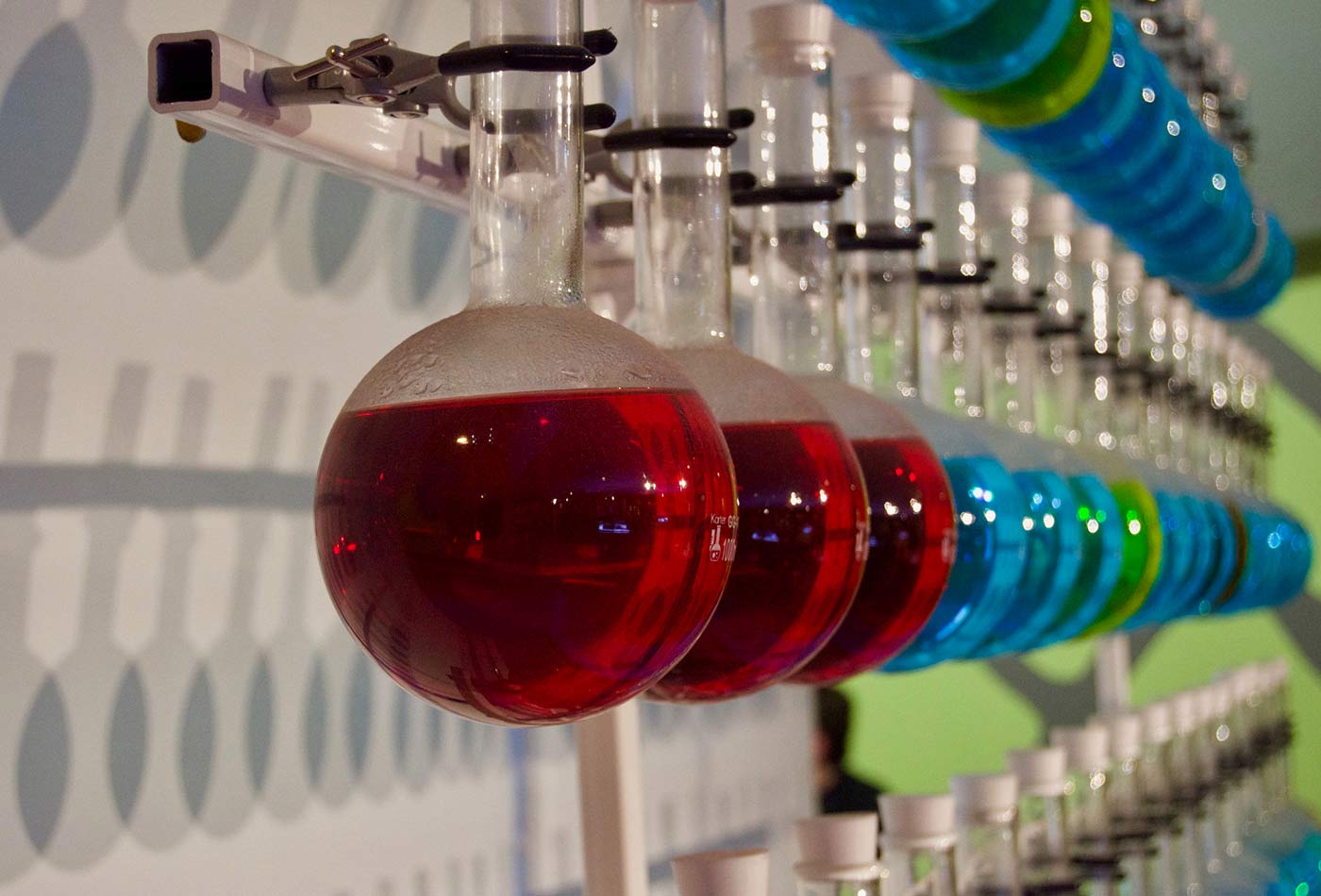Skydeck turns research into reality
UC Berkeley’s startup accelerator takes university research discoveries and helps translate them into marketable products.
 Beakers (source: Nick Amoscato on Flickr)
Beakers (source: Nick Amoscato on Flickr)
The Berkeley acceleration method
The Berkeley Skydeck office is located in the penthouse of the tallest building in downtown Berkeley. Sweeping views of the bay are accessible from virtually every face of the large, open-concept space, surely providing inspiration to the teams selected for this spring’s portfolio. There is a modest kitchen, plenty of desk space, and perhaps most importantly, a large quantity of coffee.
Skydeck has built a space for their teams to work comfortably, and hopefully effectively, with the idea that they can accomplish most tasks in-house. Cultured through workshops, mentorship experiences, and a creative environment to develop in, teams are given the resources necessary to strengthen each of these facets. At the start of the portfolio period, each startup is given $50,000 in investments from the Berkeley SkyDeck Fund, with an additional $50,000 to follow after completion of half of the program. Over the course of six months, teams complete the Berkeley Acceleration Method (BAM) where they attend mandatory training in each of the six practice areas:
-
Design
-
Funding plan
-
Business model
-
Team development
-
Product story
-
Market traction
These training sessions are conducted by specialists who focus solely on one area. For example, David Riemer, lecturer at the UC Berkeley Haas School of Business, helps teams develop their product story and Hilary Weber, founder of Opportu, offers guidance in team development.
A Skydeck startup’s resources
Beyond useful resources offered in the office, the accelerator also provides an abundance of human capital to its portfolio teams in the form of 115+ advisors and 27 partners. These advisors provide expertise on developing business models, raising funding, and so many other tasks that are key to growing a startup. The accessibility of these advisors is a significant feature of the program. Each team is matched with a lead advisor to remain in direct contact with throughout their participation in the program. Teams are also encouraged to contact anyone on the advisory board and to attend office hours for one-on-one counseling regarding branding, intellectual property, product development, and more. The advisors come from extremely diverse backgrounds, ranging anywhere from being a seed investor to being a chief scientist, providing the portfolio teams with a variety of consultants.

Skydeck participants also have access to a variety of technical resources. The Haas Startup Squad is a group of current MBA students from the Haas School of Business who help the teams with business applications, such as market research. There is also a group of Berkeley post-docs that are available for technical science questions regardless of the topic or field. From a design perspective, there are Berkeley students who will assist with graphic design projects and industrial designing.
In terms of on-campus resources, Skydeck startups also have access to the Molecular Foundry and the Jacobs Institute. The Molecular Foundry is a component of the Lawrence Berkeley National Labs. Through the foundry, researchers have access to resources for nanofabrication, nanostructure imaging, and synthetic biology protocols. The Jacobs Institute is geared towards industrial engineering and provides community access to 3-D printers, an electronics lab, machine shops, and more.
Funding the accelerator program
With the vast amount of resources available to teams and the up to $100,000 investment in each startup, Skydeck must raise a large quantity of funding to support its high-cost program. The Berkeley SkyDeck Fund is supported by global venture capital investors with two major partnership levels.
Silver Bear Partners can invest into in-depth connections at Skydeck with a seat on the Skydeck External Advisory Board, access to Skydeck workshops, the ability to host a Skydeck workshop, and more. Both Ford and Intel are currently Silver Bear Partners. Golden Bear Partners carry a bit more weight with access to the entire Skydeck review pipeline (accounting for more than 1,000 startups each year), selection of a team for incubation through the bi-annual program, two seats on the Skydeck External Advisory Board, and all of the original benefits of the Silver Bear Partner program. Other ways for outside involvement in Skydeck include being a vendor, sponsor, resource, or global partner. Current Golden Bear Partners include Ericsson and Analog Devices.
Additionally, the $100K investment provided by Skydeck is in exchange for an equivalence 5% equity. Half of the carry profits from the whole process end up donated back to Skydeck and to UC Berkeley in the hopes that these funds will provide for the next generation of Berkeley entrepreneurs.
The Skydeck portfolio
Skydeck offers an agnostic selection process for their seasonal startups, resulting in an extremely diverse group of teams each term. The only real selection criteria for each funding season is that one of the startup team members must be affiliated with UC Berkeley in some way, whether it is through being a student, alumni, or even a professor at the university. Since 2012, Skydeck has hosted 150 startups that include companies such as Zephyrus Biosciences, First Derm, and CinderBio.
Zephyrus Biosciences creates technology that automates a key technique in wet lab research, performing electrophoresis. The company’s instrument enables automation of electrophoresis and photocapture to analyze protein expression of cell suspensions. The company was acquired by Bio-Techne Corporation in 2016 and was integrated into the Proteins Platform Division.
First Derm is an online platform to connect patients to dermatologists in under 24 hours. Users submit two pictures of their affected skin area, submit a case to First Derm’s team of dermatologists, and receive feedback from the company’s online doctors. First Derm’s quick review of cases often prevents unnecessary trips to a doctor’s office, potentially making their $29 case fee the economical option for patients.
CinderBio creates enzyme technology from volcanic water microbes that remain active at high heat and extremely low pH. The company’s enzymes allow researchers to reduce the costs of basic lab enzyme experiments due to the efficiency of the ultra-stable technology. CinderBio’s product has applications in research as well as in biofuels and the company received NSF awards in both 2015 and 2016.
The select startups for this Spring 2018 portfolio range anywhere from working on an online breastfeeding resource to designing technology that combats antibiotic resistance.
May & Meadow is a digital health technology addressing breastfeeding with a combination of clinical science and sensor diagnostics. The company aims to improve data collection on feeding in order to provide mothers with personalized information and to clear up questions regarding their baby’s nutritional health.
Sublime Therapeutics and Nextbiotics both intend to impact clinical medicine. Sublime focuses on developing anti-gastrin technology to target gastrointestinal, pancreatic, and neuroendocrine cancers. Nextbiotics uses CRISPR and bacteriophage technology to reverse antibiotic resistance for applications in humans, as well as in the environment.
BioXplor is an AI platform for use in life science discoveries. An intersection between data collection and computing, BioXplor’s technology enables hypothesis generation and the development of novel predictions for research and development with drug discovery. Data is gathered from electronic medical records, genomics data, and other relevant resources. This data is then interpreted via the company’s accelerated and automated process in order to provide useful insights to its users.
All of the companies seek to address an impactful problem with an innovative solution and Skydeck offers the resources and expertise to take each company from startup to market-impactor. While other accelerators, such as IndieBio, focus on a specific sector of the market, Skydeck encourages any Berkeley-affiliated team with a feasible vision to apply to the program. This promotes a diverse group of startups that have the potential to affect society in many different ways, through many different technologies.
For more information on the Skydeck program, please visit the website (http://skydeck.berkeley.edu/). Other teams participating in the spring 2018 Skydeck portfolio can be found through the following link: http://skydeck.berkeley.edu/portfolio/.
